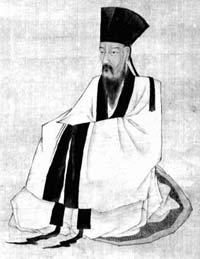Wang Shouren
Wang Shouren ( Chinese 王守仁 , Pinyin Wáng Shǒurén , W.-G. Wang Shou-jen , born 1472 ; died 1529 ) was a philosopher of neo-Confucian tradition during the Chinese Ming dynasty . After Zhu Xi , he is widely considered to be the most important neo-Confucian thinker. He is also known under the name Wang Yangming ( 王 阳明 , Wáng Yángmíng ). He rejected the dualistic interpretations of neo-Confucianism according to Zhu Xi. Wang was also known in literary circles as Wang Ming Xiansheng ( 王明 先生 , Wáng Míng Xiānshēng ) or Wang Mingzi ( 王明子 , Wáng Míngzi ).
Live and act
Born Wang Shouren in Yuyao, Zhejiang Province , Wang was given the courtesy name Bo'an ( 伯安 , Bó'ān ). His father was a count and a minister. Wang received his first civil servant degree in 1492 and his second in 1499. He served as an assistant in various ministries until he was banished in 1506 for harsh criticism of an influential eunuch . However, Wang later became the governor of Jiangxi .
Wang became a successful general and was known for the strict discipline he imposed on his troops. In 1519, while serving as governor of Jiangxi Province, he suppressed Prince Zhu Zhenhao's revolt. He was one of the first to use a new breech-loading cannon called Fo-lang-ji ( 佛 郎 機 / 佛 郎 机 ) in battle, which was brought into the country by the Portuguese traders who had just arrived in China. As governor of Jiangxi, he also built schools, rehabilitated and rebuilt rebels, which the enemy destroyed during the uprising.
philosophy
Wang was the leading figure in the neo-Confucian school of thought founded by Lu Jiuyuan in the Southern Song Dynasty . This school advocated the continuation of the thoughts of Menzius and focused on the unity of knowledge and action. The opposite school of principle ( 理 , lǐ ) treats the acquisition of knowledge as a kind of preparation or self-cultivation, which can only guide action after successful completion.
Innate knowledge
Wang Yangming developed the idea of innate knowledge. He argued that everyone knows the difference between good and bad from birth. Such knowledge is intuitive and not rational. Wang Yangming closely follows Menzius' good or original or innate knowledge ( 良知 , liángzhī ). Wang's ideas in this direction later inspired prominent Japanese thinkers such as Motoori Norinaga . He argued that because of the Shinto deities, the Japanese alone had the intuitive ability to distinguish good and bad. His school of thought (Ōyōmei-gaku in Japanese; Ō stands for the surname “Wang”, Yōmei stands for “Yangming”, Gaku means “school of learning”) has also strongly influenced Japanese samurai ethics.
Wang's attitudes to action are also closely related to innate knowledge. In keeping with tradition, different aspects of philosophy can be traced back to one origin for Wang, good action is also an inevitable consequence of innate knowledge of good action. With the help of a picture of filial piety, he tries to make these connections clear: the feeling of piety towards the parents is not dependent on the behavior or the characteristics of the parents, but is already in the human heart and naturally urges realization.
Spirit and world
Wang does not consider the phenomena in the world to be completely independent of the mind of the individual, for the mind first forms these phenomena. The mind alone is the source of all reason. This becomes clear in a conversation Wang spoke with a friend about the blossoms of a tree. The friend doubts that the tree in its blossom has anything to do with the human spirit, that it is completely external. Wang Yangming then replied:
“Before you looked at these flowers, both them and your heart were in a state of silent emptiness. Only at the moment when you looked at them did they suddenly glow in their colors and take on their clear form. From this you can see that outside of your heart they do not exist at all. "
Here, too, Wang's reference to the interior is evident as the source of everything.
See also
literature
- Iso Kern : The most important thing in life. Wang Yangming (1472–1529) and his successors on the «Realization of Original Knowledge» . Schwabe, Basel 2010, ISBN 978-3-7965-2514-8
- Kenji Shimada: The Neo-Confucian Philosophy. The school directions Chu Hsis and Wang Yang-mings . 2nd ed. Reimer, Berlin 1987. (= Marburg studies on African and Asian studies, Ser. B; 9.)
Web links
- Bryan Van Norden: Wang Yangming. In: Edward N. Zalta (Ed.): Stanford Encyclopedia of Philosophy .
| personal data | |
|---|---|
| SURNAME | Wang, Shouren |
| ALTERNATIVE NAMES | 王守仁 (Chinese); Wáng, Shǒurén; Wang, Yangming |
| BRIEF DESCRIPTION | Chinese philosopher of neo-Confucian tradition |
| DATE OF BIRTH | 1472 |
| DATE OF DEATH | 1529 |
